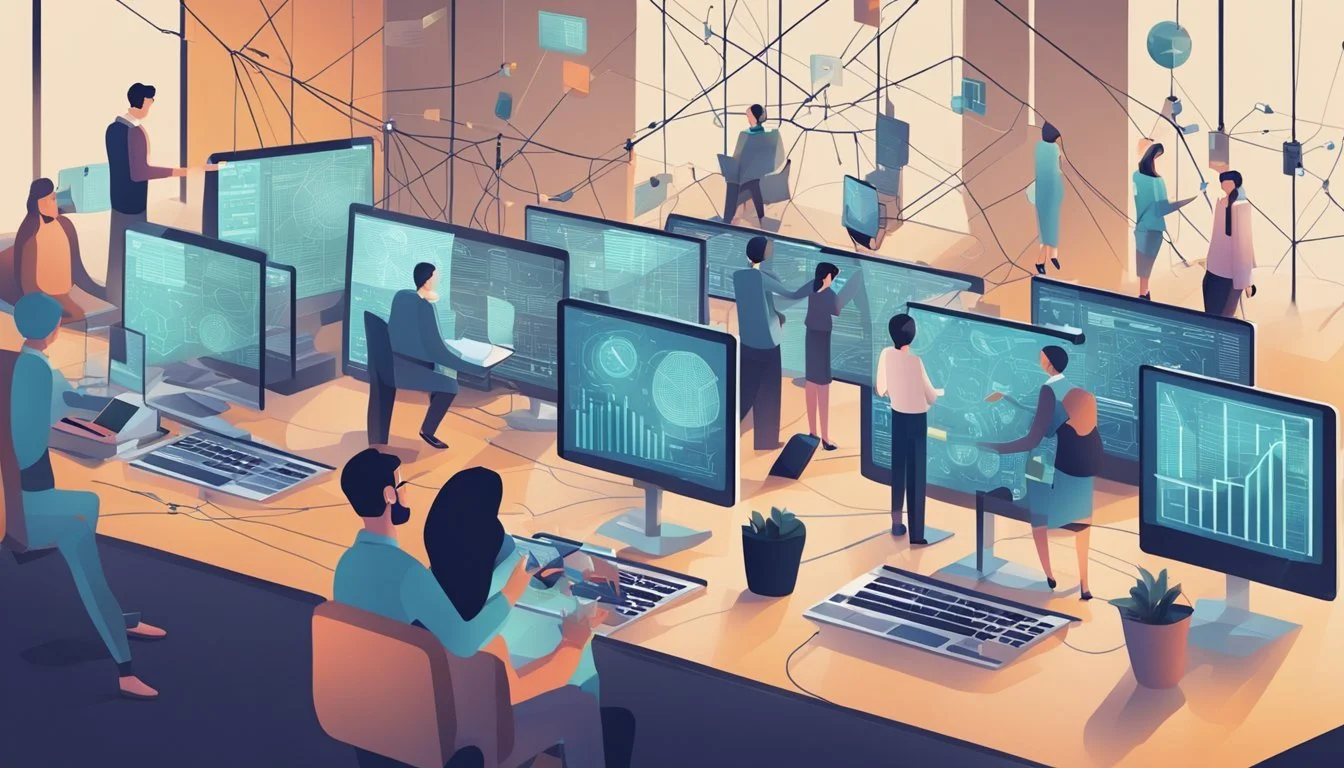6 Documentaries That Reveal the Science Behind Conspiracy Theories
Unmasking Myths with Facts
Conspiracy theories have long captivated public interest, often blending fact and fiction in compelling narratives. Documentaries exploring these theories offer viewers a chance to examine the evidence and reasoning behind various claims. By presenting interviews, historical footage, and expert analysis, these films shed light on the origins and spread of conspiracy beliefs.
These documentaries not only entertain but also educate viewers on critical thinking and the importance of evaluating sources. They delve into the psychology behind why people are drawn to conspiracy theories and how these ideas can gain traction in society. By examining the science and logic behind these beliefs, viewers can gain a better understanding of how to approach and analyze controversial claims.
1) 'Out of the Shadows' - reveals manipulation through media
'Out of the Shadows' is a documentary that explores alleged manipulation by mainstream media and Hollywood. The film features interviews with former CIA officials and media insiders.
It examines the concept of "Operation Mockingbird," a purported CIA program to influence media. The documentary suggests intelligence agencies have long-standing ties to entertainment industries.
'Out of the Shadows' gained significant attention after its release on YouTube in April 2020. It quickly amassed millions of views, indicating public interest in its subject matter.
The film discusses how propaganda may be spread through popular media channels. It raises questions about the authenticity of information presented in movies and news.
Critics argue the documentary itself may contain unverified claims. Viewers are encouraged to approach its content with critical thinking and seek additional sources.
https://www.imdb.com/title/tt12131262/
2) 'The Great Hack' - examines data exploitation
'The Great Hack' explores the Cambridge Analytica scandal and its far-reaching implications for data privacy. The documentary delves into how personal information became a valuable commodity in the digital age.
Directors Karim Amer and Jehane Noujaim present a compelling narrative that follows key figures involved in the scandal. They shed light on the complex web of data collection, analysis, and manipulation.
The film examines how Cambridge Analytica harvested Facebook user data without consent. It reveals how this information was used to create targeted political advertisements during major campaigns.
'The Great Hack' raises critical questions about digital privacy and the ethics of data exploitation. It showcases the power of big data in shaping public opinion and influencing democratic processes.
Through interviews and archival footage, the documentary paints a disturbing picture of modern information warfare. It serves as a wake-up call about the potential misuse of personal data in the digital era.
https://en.wikipedia.org/wiki/The_Great_Hack
3) 'Behind the Curve' - explores flat earth believers
'Behind the Curve' is a 2018 documentary that delves into the world of flat Earth believers. The film follows prominent figures in the flat Earth community, including Mark Sargent and Patricia Steere.
Director Daniel J. Clark presents various perspectives on the flat Earth theory. He showcases the ideas and arguments put forth by flat Earth proponents.
The documentary also features scientists and skeptics who provide counterarguments to the flat Earth claims. It explores the psychology behind why people might be drawn to such beliefs.
'Behind the Curve' examines the social aspects of the flat Earth movement. It shows how believers connect through conferences and online communities.
The film highlights some of the experiments flat Earthers conduct to prove their theories. It also demonstrates how these experiments often end up supporting the spherical Earth model instead.
4) 'American Dharma' - insight into political tactics
'American Dharma' is a documentary directed by Errol Morris that features an extended conversation with Steve Bannon, a controversial political strategist. The film explores Bannon's role in Donald Trump's 2016 presidential campaign and his time as chief executive of Breitbart News.
Through this dialogue, viewers gain insight into the political tactics employed by Bannon and his allies. The documentary sheds light on the strategies used to shape public opinion and influence political outcomes.
Morris probes Bannon's background in filmmaking and his approach to crafting political narratives. This reveals how media and messaging techniques are leveraged in modern political campaigns.
The film also touches on Bannon's brief tenure on the United States National Security Council during the Trump administration. This provides a glimpse into the inner workings of political power structures.
While 'American Dharma' has faced criticism for its portrayal of Bannon, it offers a unique perspective on the mechanics of contemporary political strategy.
https://en.wikipedia.org/wiki/American_Dharma
5) 'Social Dilemma' - unveils tech industry secrets
'The Social Dilemma' exposes the hidden mechanisms behind social media platforms. This documentary features former tech executives and engineers who reveal insider information about the industry's practices.
The film explores how social media companies design their platforms to capture and maintain user attention. It highlights the use of persuasive technology to influence user behavior and keep people engaged for longer periods.
'The Social Dilemma' examines the psychological impact of social media on individuals and society. It discusses issues such as addiction, mental health concerns, and the spread of misinformation.
The documentary also addresses the data collection practices of tech companies. It explains how user information is gathered, analyzed, and monetized through targeted advertising.
Through interviews and dramatized scenes, the film illustrates the potential consequences of unchecked social media use. It raises questions about privacy, digital well-being, and the ethical responsibilities of tech companies.
[https://en.wikipedia.org/wiki/The_Social_Dilemma]
6) 'Room 237' - analyzes hidden messages in films
'Room 237' explores various interpretations of Stanley Kubrick's 'The Shining'. The documentary features five narrators who share their theories about hidden meanings in the film.
One narrator proposes that 'The Shining' is an allegory for the genocide of Native Americans. Another suggests it's Kubrick's confession to faking the Apollo 11 moon landing footage.
The film examines recurring motifs, such as patterns in the hotel carpet and the significance of Room 237 itself. It delves into numerology and spatial oddities within the Overlook Hotel's layout.
'Room 237' showcases how viewers can find deeper meanings in films, whether intentional or not. It demonstrates the power of cinema to inspire intense analysis and debate.
The documentary raises questions about authorial intent versus audience interpretation. It illustrates how dedicated fans can construct elaborate theories based on small details.
[https://en.wikipedia.org/wiki/Room_237]
Understanding Conspiracy Theories
Conspiracy theories offer alternative explanations for significant events, often involving secret plots by powerful groups. These beliefs stem from psychological factors and cognitive biases that shape how people interpret information and make sense of the world.
Definition and Core Concepts
Conspiracy theories propose that certain events or situations result from secret plans by influential individuals or organizations. These explanations typically contradict official accounts or mainstream understanding. Conspiracy theories often involve complex narratives that connect seemingly unrelated events or people.
Key elements of conspiracy theories include:
A belief in hidden forces controlling events
Distrust of official explanations
Perception of malicious intent by powerful groups
Attempts to uncover "hidden truths"
Psychological Factors
Several psychological factors contribute to the appeal and persistence of conspiracy theories:
Need for control and certainty: Conspiracy theories can provide a sense of order in chaotic situations.
Pattern recognition: Humans are wired to find patterns, sometimes leading to false connections.
Confirmation bias: People tend to seek information that supports their existing beliefs.
Proportionality bias: The idea that big events must have big causes.
Group identity: Shared beliefs can foster a sense of belonging and community.
These factors interact with cognitive biases and individual personality traits, influencing susceptibility to conspiracy thinking. Understanding these psychological underpinnings is crucial for addressing the spread of misinformation.
The Role of Media and Technology
Media platforms and technological advancements play a crucial role in shaping public perception of conspiracy theories. They provide channels for rapid dissemination of information and create echo chambers that can reinforce beliefs.
Impact of Social Media
Social media platforms have revolutionized how conspiracy theories spread. These digital networks allow users to share content instantly, reaching vast audiences within seconds. Algorithms often prioritize engaging content, which can include sensational or controversial claims.
Facebook, Twitter, and YouTube have become hotbeds for conspiracy theory propagation. Users can easily create and join groups dedicated to specific theories, fostering a sense of community among believers. This digital environment can amplify fringe ideas and give them an air of legitimacy.
The viral nature of social media also contributes to the rapid spread of misinformation. A single post can be shared thousands of times before fact-checkers can intervene.
Documentary Influence on Public Perception
Documentaries have emerged as powerful tools for spreading conspiracy theories. These films often present a compelling narrative that can sway viewers' opinions on complex issues.
Many conspiracy-focused documentaries use slick production values and expert-like commentary to appear credible. They may selectively present facts, omit contradictory evidence, or use emotional appeals to persuade audiences.
Streaming platforms have made these documentaries more accessible than ever. Viewers can easily find and watch content that aligns with their existing beliefs, potentially reinforcing misconceptions.
Some documentaries exploit distrust in authorities and institutions, tapping into viewers' skepticism of official narratives. This approach can be particularly effective in promoting alternative explanations for significant events.



